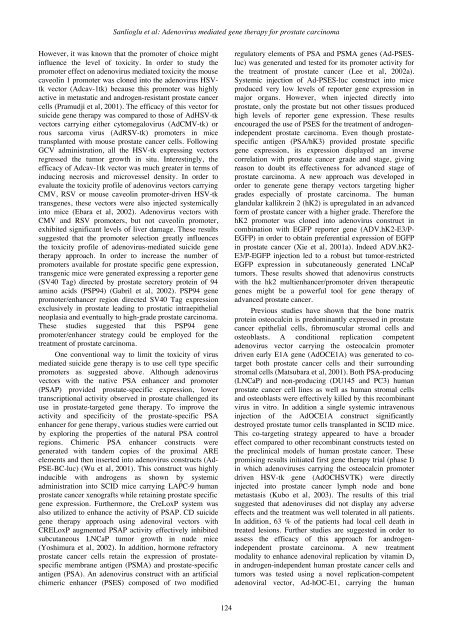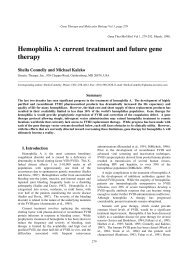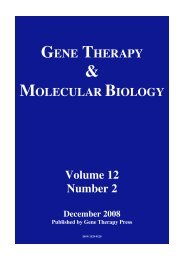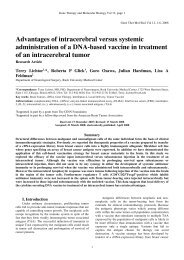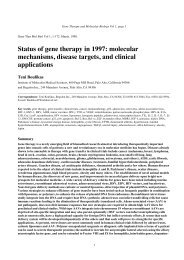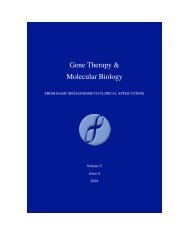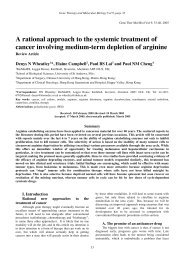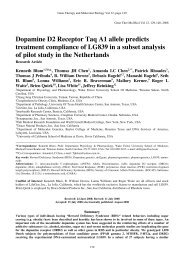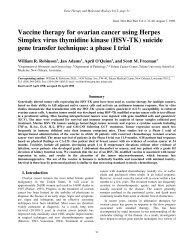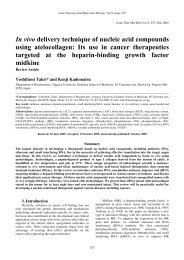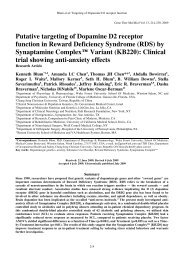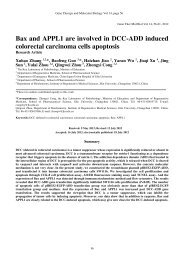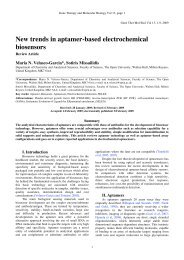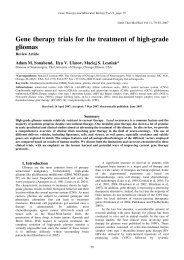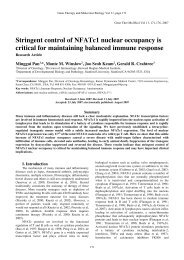GTMB 7 - Gene Therapy & Molecular Biology
GTMB 7 - Gene Therapy & Molecular Biology
GTMB 7 - Gene Therapy & Molecular Biology
You also want an ePaper? Increase the reach of your titles
YUMPU automatically turns print PDFs into web optimized ePapers that Google loves.
Sanlioglu et al: Adenovirus mediated gene therapy for prostate carcinomaHowever, it was known that the promoter of choice mightinfluence the level of toxicity. In order to study thepromoter effect on adenovirus mediated toxicity the mousecaveolin 1 promoter was cloned into the adenovirus HSVtkvector (Adcav-1tk) because this promoter was highlyactive in metastatic and androgen-resistant prostate cancercells (Pramudji et al, 2001). The efficacy of this vector forsuicide gene therapy was compared to those of AdHSV-tkvectors carrying either cytomegalovirus (AdCMV-tk) orrous sarcoma virus (AdRSV-tk) promoters in micetransplanted with mouse prostate cancer cells. FollowingGCV administration, all the HSV-tk expressing vectorsregressed the tumor growth in situ. Interestingly, theefficacy of Adcav-1tk vector was much greater in terms ofinducing necrosis and microvessel density. In order toevaluate the toxicity profile of adenovirus vectors carryingCMV, RSV or mouse caveolin promoter-driven HSV-tktransgenes, these vectors were also injected systemicallyinto mice (Ebara et al, 2002). Adenovirus vectors withCMV and RSV promoters, but not caveolin promoter,exhibited significant levels of liver damage. These resultssuggested that the promoter selection greatly influencesthe toxicity profile of adenovirus-mediated suicide genetherapy approach. In order to increase the number ofpromoters available for prostate specific gene expression,transgenic mice were generated expressing a reporter gene(SV40 Tag) directed by prostate secretory protein of 94amino acids (PSP94) (Gabril et al, 2002). PSP94 genepromoter/enhancer region directed SV40 Tag expressionexclusively in prostate leading to prostatic intraepithelialneoplasia and eventually to high-grade prostate carcinoma.These studies suggested that this PSP94 genepromoter/enhancer strategy could be employed for thetreatment of prostate carcinoma.One conventional way to limit the toxicity of virusmediated suicide gene therapy is to use cell type specificpromoters as suggested above. Although adenovirusvectors with the native PSA enhancer and promoter(PSAP) provided prostate-specific expression, lowertranscriptional activity observed in prostate challenged itsuse in prostate-targeted gene therapy. To improve theactivity and specificity of the prostate-specific PSAenhancer for gene therapy, various studies were carried outby exploring the properties of the natural PSA controlregions. Chimeric PSA enhancer constructs weregenerated with tandem copies of the proximal AREelements and then inserted into adenovirus constructs (Ad-PSE-BC-luc) (Wu et al, 2001). This construct was highlyinducible with androgens as shown by systemicadministration into SCID mice carrying LAPC-9 humanprostate cancer xenografts while retaining prostate specificgene expression. Furthermore, the CreLoxP system wasalso utilized to enhance the activity of PSAP. CD suicidegene therapy approach using adenoviral vectors withCRELoxP augmented PSAP activity effectively inhibitedsubcutaneous LNCaP tumor growth in nude mice(Yoshimura et al, 2002). In addition, hormone refractoryprostate cancer cells retain the expression of prostatespecificmembrane antigen (PSMA) and prostate-specificantigen (PSA). An adenovirus construct with an artificialchimeric enhancer (PSES) composed of two modifiedregulatory elements of PSA and PSMA genes (Ad-PSESluc)was generated and tested for its promoter activity forthe treatment of prostate cancer (Lee et al, 2002a).Systemic injection of Ad-PSES-luc construct into miceproduced very low levels of reporter gene expression inmajor organs. However, when injected directly intoprostate, only the prostate but not other tissues producedhigh levels of reporter gene expression. These resultsencouraged the use of PSES for the treatment of androgenindependentprostate carcinoma. Even though prostatespecificantigen (PSA/hK3) provided prostate specificgene expression, its expression displayed an inversecorrelation with prostate cancer grade and stage, givingreason to doubt its effectiveness for advanced stage ofprostate carcinoma. A new approach was developed inorder to generate gene therapy vectors targeting highergrades especially of prostate carcinoma. The humanglandular kallikrein 2 (hK2) is upregulated in an advancedform of prostate cancer with a higher grade. Therefore thehK2 promoter was cloned into adenovirus construct incombination with EGFP reporter gene (ADV.hK2-E3/P-EGFP) in order to obtain preferential expression of EGFPin prostate cancer (Xie et al, 2001a). Indeed ADV.hK2-E3/P-EGFP injection led to a robust but tumor-restrictedEGFP expression in subcutaneously generated LNCaPtumors. These results showed that adenovirus constructswith the hk2 multienhancer/promoter driven therapeuticgenes might be a powerful tool for gene therapy ofadvanced prostate cancer.Previous studies have shown that the bone matrixprotein osteocalcin is predominantly expressed in prostatecancer epithelial cells, fibromuscular stromal cells andosteoblasts. A conditional replication competentadenovirus vector carrying the osteocalcin promoterdriven early E1A gene (AdOCE1A) was generated to cotargetboth prostate cancer cells and their surroundingstromal cells (Matsubara et al, 2001). Both PSA-producing(LNCaP) and non-producing (DU145 and PC3) humanprostate cancer cell lines as well as human stromal cellsand osteoblasts were effectively killed by this recombinantvirus in vitro. In addition a single systemic intravenousinjection of the AdOCE1A construct significantlydestroyed prostate tumor cells transplanted in SCID mice.This co-targeting strategy appeared to have a broadereffect compared to other recombinant constructs tested onthe preclinical models of human prostate cancer. Thesepromising results initiated first gene therapy trial (phase I)in which adenoviruses carrying the osteocalcin promoterdriven HSV-tk gene (AdOCHSVTK) were directlyinjected into prostate cancer lymph node and bonemetastasis (Kubo et al, 2003). The results of this trialsuggested that adenoviruses did not display any adverseeffects and the treatment was well tolerated in all patients.In addition, 63 % of the patients had local cell death intreated lesions. Further studies are suggested in order toassess the efficacy of this approach for androgenindependentprostate carcinoma. A new treatmentmodality to enhance adenoviral replication by vitamin D 3in androgen-independent human prostate cancer cells andtumors was tested using a novel replication-competentadenoviral vector, Ad-hOC-E1, carrying the human124


